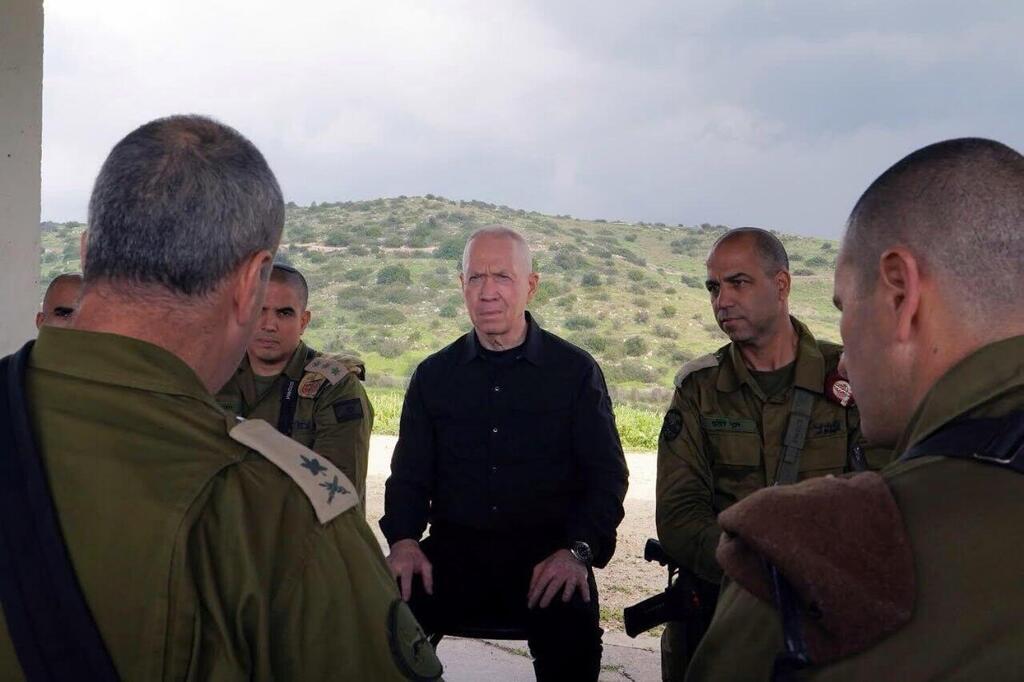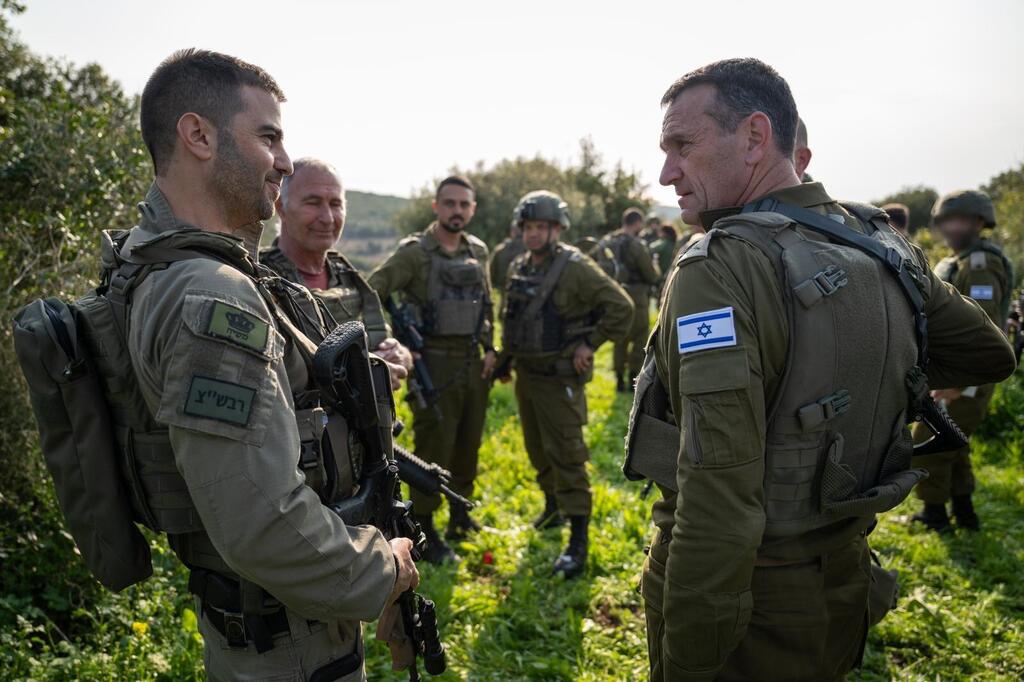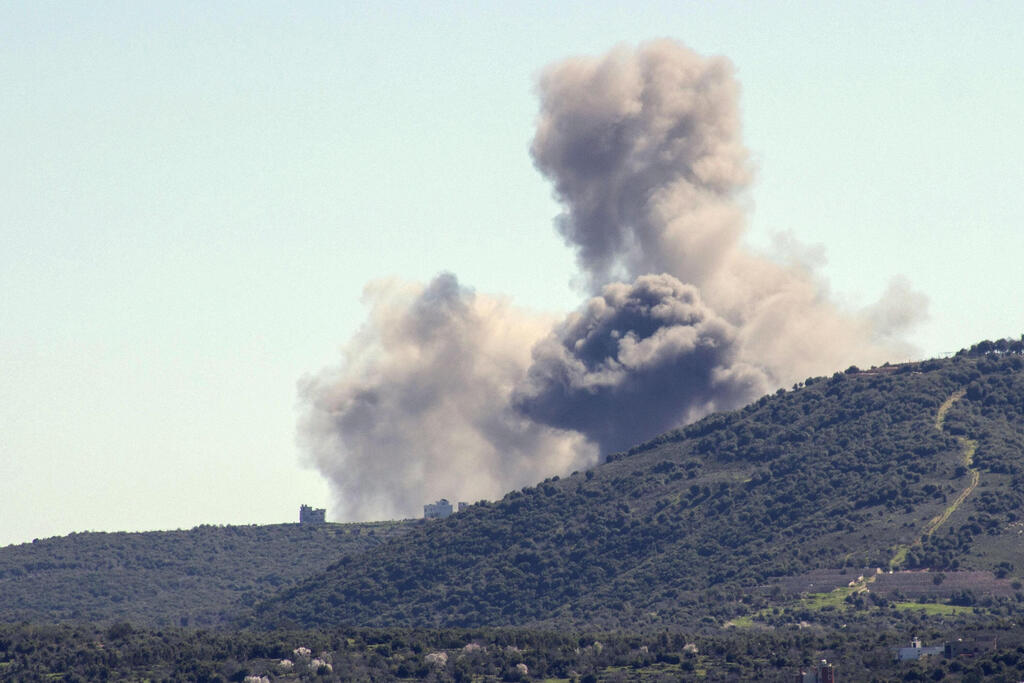Israeli airstrike on Hezbollah military compound in southern Lebanon
(Video: IDF Spokesperson's Unit)
With fighting in the Gaza Strip winding down in intensity, the focus of Israel's senior government and military officials has shifted northward.
More stories:
Following the elimination of five senior Hezbollah commanders last week and the terror organization’s response of launching widespread rocket barrages into the Galilee region, it is evident that the military confrontation at the Lebanon border is reaching a boiling point.
The Air Force continued to pound targets in southern Lebanon Thursday morning, following the elimination of several targets in the Syrian capital of Damascus and the southern Lebanon village of Kafra overnight.
IDF Chief of Staff Herzi Halevi visited the Galilee on Tuesday and conducted a situation assessment with the 146th Division, before meeting with the local alert squad in the border farming community of Shtula. Halevi told them, "Hezbollah decided on the evening of October 7 to join the conflict and will pay a very heavy price for it," assuring that residents would return home to a place safe from terrorists.
Defense Minister Yoav Gallant, who paid a visit to the Northern Command the previous day, said that the Security Cabinet is "planning to intensify the firepower against Hezbollah, which is failing to find replacements for the commanders we are eliminating."
Despite the frustration of residents displaced from their homes nearly five months ago, with their return still appearing distant, and amid extensive rocket barrages and continuous firing by anti-tank missile units at the evacuated settlements, the IDF maintains that the war's achievements to date have shifted the balance of power regarding Hezbollah's threat to northern settlements. However, the campaign is far from over.
3 View gallery


Defense Minister Yoav Gallant holds a situation assessment at Northern Command
(Photo: Defense Ministry)
Amid these "limited attacks," driven by political pressure from the U.S. and France and the pursuit of a diplomatic agreement to counter Hezbollah without escalating the conflict, reports from Lebanon indicate that the Air Force and intelligence operations directed by the Northern Command have inflicted significant losses on Hezbollah's upper echelon, particularly targeting veteran members whose loss inflicts irreparable damage.
In recent weeks, according to foreign reports, five senior Hezbollah members, including brigade commanders with years of control over certain areas near the Israel border, were eliminated.
These individuals possessed deep knowledge and experience and were responsible for regions such as Mount Dov, Ghajar, Khiam, and Bint Jbeil, as well as senior military operatives within the group's elite Radwan forces. Countless attacks on military targets were orchestrated under their command.
Unlike IDF officials, who often rotate positions, Hezbollah's senior commanders have a long-term presence and command in their designated areas, contributing to their strategic significance. This includes key figures in the Radwan forces and Hezbollah's air force.
Israeli airstrike on military compound of Hezbollah's elite Radwan force in southern Lebanon
(Video: IDF Spokesperson's Unit)
"We are operating on two main vectors: targeting Hezbollah's infrastructure along the border and striking its operatives," a senior military official explained to Ynet News.
"Today, Hezbollah is counting over 250 dead terrorists, and just last week, we eliminated two of their brigade commanders. Initiative is key. Every day, no matter what, we launch our own sorties to systematically attack infrastructure, operatives and commanders.
“We are actively enhancing our readiness for an attack, focusing on target development, brigade and battalion training and finalizing our attack plan. Everything is aimed at transforming the security landscape in the north.”
As Hezbollah's rocket fire extends toward the Golan Heights and Mount Meron, IDF officials note that Air Force jets are flying and expanding their strike range up to the areas of Sidon, Beirut and even Baalbek, roughly 60 miles from Metula, Israel’s northernmost settlement.
Hezbollah clip purportedly showing missile attack on Israeli airbase in Meron
Every evening in the Northern Command bunker, the Fire Control Center is preparing for the next day's battle. The forces have access to an extensively prepared arsenal of targets, developed over years by the Combat Intelligence Collection Corps and Military Intelligence, augmented by numerous new objectives identified since the onset of the war.
They determine the priorities and targets for the IDF to neutralize. In the early weeks of the conflict, more than a hundred posts and observation positions monitoring the Galilee settlements were destroyed.
Now, Hezbollah's forces largely operate from private homes, using them as bases for shooting and intelligence gathering on IDF movements.
Lt. Gen. Halevi said on Wednesday that the operation will not conclude until "Hezbollah is nowhere near the fence, not close and not behind close."
3 View gallery


IDF Chief of Staff Lt. Gen. Herzi Halevi ׂ(right) holds a situation assessment at the northern border
(Photo: IDF Spokesperson's Unit)
Amid political efforts to negotiate a settlement, the military is working to transform the region beyond the border into a reality starkly different from the one familiar to the local population, supportive of Hezbollah, before they fled.
Giora Zaltz, the head of the Upper Galilee Regional Council, commended Lt. Gen. Halevi's remarks on the post-war reality the IDF seeks to create.
However, he emphasized that Galilee residents demand any agreement to definitively eliminate the direct missile threat and prevent terrorist infiltrations.






